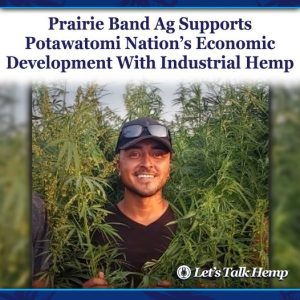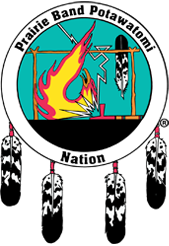February 21, 2023—
In 2018, when the federal Farm Bill legalized the regulated production of hemp after 80 years of prohibition, Theo Wahquahboshkuk was just about to finish his degree in environmental science at Haskell Indian Nations University in Lawrence, Kansas. He had become interested in the environmental applications of hemp, particularly for soil remediation. Meanwhile, the leadership of his Native American tribe, the Prairie Band Potawatomi Nation, was looking into the crop to add to its farming rotation. The tribe had been leasing land for conventional agricultural production of row crops, but excess applications of fertilizers and pesticides had taken their toll. The tribe saw hemp as a way to heal the soil.
“These are our only lands for the tribe – for us – and our children and grandchildren,” Wahquahboshkuk says, citing the need for careful stewardship of the tribe’s acreage.

Theo Wahquahboshkuk of the Prairie Band Potawatomi Nation in Kansas.
The Prairie Band Potawatomi Nation sits on 77, 000 acres near Mayetta, Kansas, and owns about half of that land. Only a few thousand acres are available for agriculture, Wahquahboshkuk says, with the remaining land taken up with non-tribal ownership, housing and commercial space, hay ground, and land left idle for wetlands and prairie restoration projects. In addition to agriculture, the tribe has traditionally owned and operated convenience stores and is also involved in health services and casino ownership.
In 2020, after a couple of years of research into hemp farming, members of the tribe’s executive team presented what they had learned to the membership. They won a vote to begin growing hemp under the tribe’s Prairie Band Ag LLC, with a percentage of profits going back to the community. The Nation is a sovereign state and had to write its own hemp plan for approval by the USDA. All compliance is managed by the tribe’s own regulatory body, which conducts testing to ensure crops remain under the 0.3% THC limit set by federal law. The tribe is bound by all federal compliance regulations for testing and transportation.
In 2021, the tribe planted 15 acres of hemp, which grew well but tested above the 0.3% THC limit – which meant the crops had to be destroyed. “We had to slash and burn it all,” Wahquahboshkuk says. Despite this setback, the tribe decided to continue the program.
“We have a lot of community support who believe in the potential of hemp,” Wahquahboshkuk says.
Indeed, the Nation’s hemp program has grown, as have ambitions for the crop. The tribe spent 18 months building a processing facility and installing Fiber Track decortication equipment. Plans for 2023 are to make the facility fully operational so it can break down bales and clean and separate the plant into various sizes of hurd or mill it into powder. The Nation plans to plant 350 acres this year, Wahquahboshkuk says.
In addition, Prairie Band Ag plans to “educate, educate, educate,” Wahquahboshkuk says. Prairie Band holds growers’ meetings for surrounding farmers to teach them about growing hemp. Through meetings and tours of the hemp fields, the tribe seeks to dispel any stigma about cannabis.
At the growers’ meetings, Prairie Band Ag members share their experience, discuss equipment, and describe how to work with the tribe. They also cover seed sourcing and discuss financials, walking other farmers through the economics of growing hemp. Most important, Prairie Band can guarantee purchase for quality bales, thereby addressing the area of most concern for farmers trying a new crop, Wahquahboshkuk says. Prairie Band can evaluate what the farmers grow and conduct field visits to answer questions, he adds.
“We want our farmer partners to feel as comfortable and positive as possible,” Wahquahboshkuk says, adding that 200 acres will be grown by partner farmers outside the tribal lands this year.
Wahquahboshkuk says his focus this year is on enlarging the business and working to find markets for Prairie Band Ag’s raw materials. Observing that the market for hurd is currently limited to manufacturers of animal bedding and kitty litter, he cites a “constant search for customers who need raw materials” and says he is exploring the building market.
Wahquahboshkuk also says he would like to see more grant funding, such as the USDA’s Climate-Smart Commodity grants, go to hemp. Currently, all of the operations at Prairie Band are funded by the tribe and profits go back into the business, he says.
Above all, Wahquahboshkuk says, he wants to see the industrial hemp industry expand and benefit other farmers. The Nation’s plans for the next few years include “putting ourselves out there, being transparent and advocating for the industry,” he says. “We need everyone on board for the hemp industry to grow.”
This article originally appeared on the Let’s Talk Hemp website, reprinted by permission.
